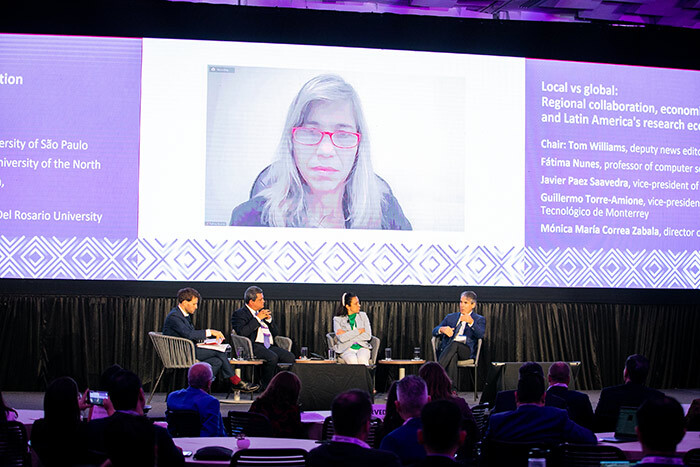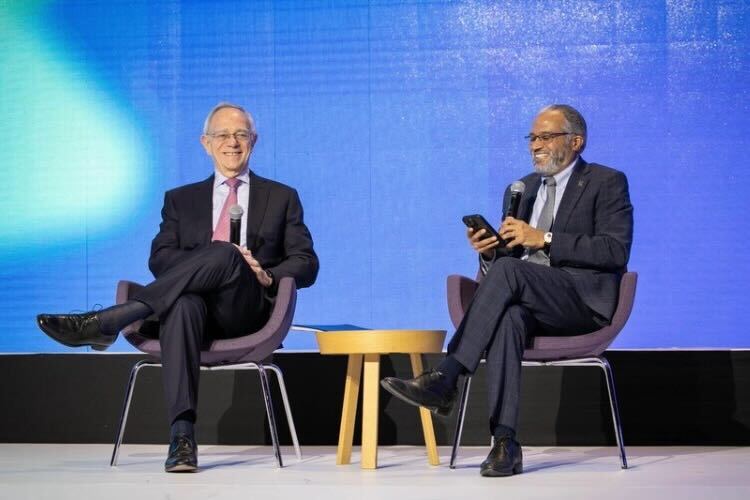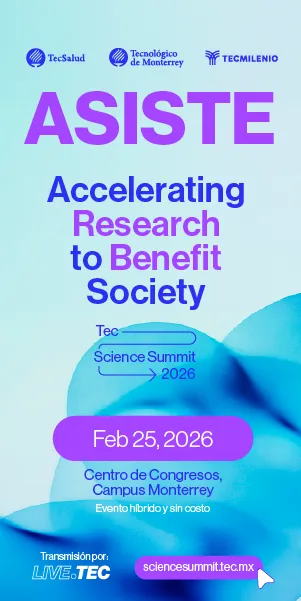Latin America is one of the richest regions in language diversity, cultures, ecosystems, and species, however, in terms of scientific research, it is behind others such as North America and Europe.
During THE Latin America Universities Summit event, held on July 3 and 4, 2023, at the Tec de Monterrey Congress Center, Campus Monterrey, four representatives from universities in the region discussed their local perspectives and how to achieve a greater collaboration in the region.
In the Local vs global talk: Regional collaboration, economic integration and Latin America’s research ecosystem, moderated by Tom Williams, Editor-in-Chief of Times Higher Education (THE), Guillermo Torre, of TecSalud and Vice President of Research at Tec de Monterrey, Fátima Nunes, Javier Páez Saavedra and Mónica Correa Zabala explained their strategies for promoting scientific research at their universities.
Scientific research in Latin America
In the first round of questions, Javier Paez, Vice Chancellor for Research at the Universidad del Norte, Colombia, explained that something that many countries in Latin America share in terms of scientific research is underfunding.
That is why, at Universidad del Norte, they focus on seeking greater economic incentives to be able to do high-impact research that transcends local solutions and reaches global ones. “Currently, our financing is mainly focused on local needs and not global ones, that is something we want to change,” he said.
Mónica Correa Zabala, director of planning of the Universidad del Rosario, Colombia, mentioned that her university is the oldest in the country, with 370 years of tradition. In the last 15 years, their commitment has been to promote scientific research, fostering national and international collaborations to achieve that fine balance between local and global solutions.
“We want to be at the forefront of not only research at the national level but also internationally,” she said.
For his part, Guillermo Torre emphasized that in Latin America the agendas of current governments do not necessarily benefit research. This has led him to wonder why it is important to do scientific research and promote it.
“I think, if you put it in perspective, the answer is simple, the research mind will give students and teachers greater opportunities to conquer the truth,” he said. By promoting science, you get scientific, technological, and scientific innovation.
Fátima Nunes, a professor at the University of Sao Paulo, Brazil, explained that their commitment to scientific research is one of their main focuses, seeking to strengthen international collaborations.
However, in her country, they have the peculiarity that their main language is Portuguese, unlike most Latin American countries that speak Spanish. This has been an obstacle to strengthening collaboration within the region.
As a result, they are looking to implement Spanish courses to boost collaboration and “improve our science in general to solve the most important problems of the country and the region,” she said.

In the Local vs global talk: Regional collaboration, economic integration, and Latin America’s research ecosystem, representatives of universities in the region discussed the local perspectives of each one and how to achieve greater collaboration in the region. (Photo: Udell Jimenez / TecScience)
Local strategies, global impacts
According to Torre, one of the peculiarities of the research at Tec de Monterrey derives from the geographical position of the state of Monterrey, which is very close to the border states of the United States.
This has led the university to establish alliances with high-impact universities, such as the Massachusetts Institute of Technology (MIT), seeking to strengthen the research capacities of Mexican students and establish close ties with scientific groups from other countries.
For Páez Saavedra, the strategy they seek is to promote collaboration within the country and abroad. “I think the name of the game should be collaboration.” He explained that the Universidad del Norte has established alliances with other universities in the country, to do group research and get more funding that is enough for everyone.
Correa Zabala explained that 15 years ago, the Universidad del Rosario started the Young Researchers program whose objective is to attract brilliant minds, train them in science and encourage them to seek research sabbaticals in Latin American, European, or North American countries, emphasizing the avoidance of brain drain and getting that talent back to the country.
In the same way, Tec de Monterrey has sought to innovate in local problems that could be applied globally. With their educational program, Tec 21, they seek to implement a way of teaching that is transformative at the local level, teaching students through challenges based on life real problems.
Its results, which remain to be seen, could be applied globally since if global trends are analyzed, it is evident that innovation is being sought in educational terms around the world.
Finally, Torre-Amione emphasized that in an environment where investment in research is as low as in Latin American countries, it is necessary to think of new ways to obtain financing.
That is why in recent years, the Tec de Monterrey has opted to continue promoting international alliances, but to use the industries present in Monterrey to create companies within the university that can attract resources for scientific research.
“You have to be globally competitive and apply the solutions globally. If your solution is successful, I believe there will be economic benefits for your country, your university, your researchers and for the company,” he concluded.
















